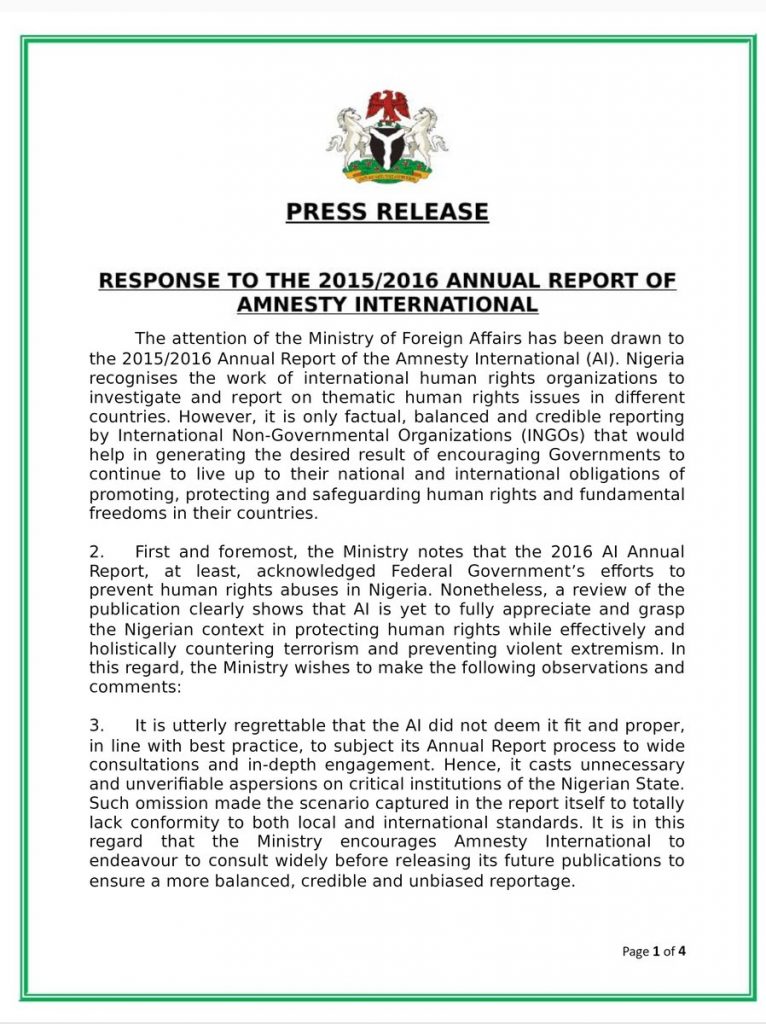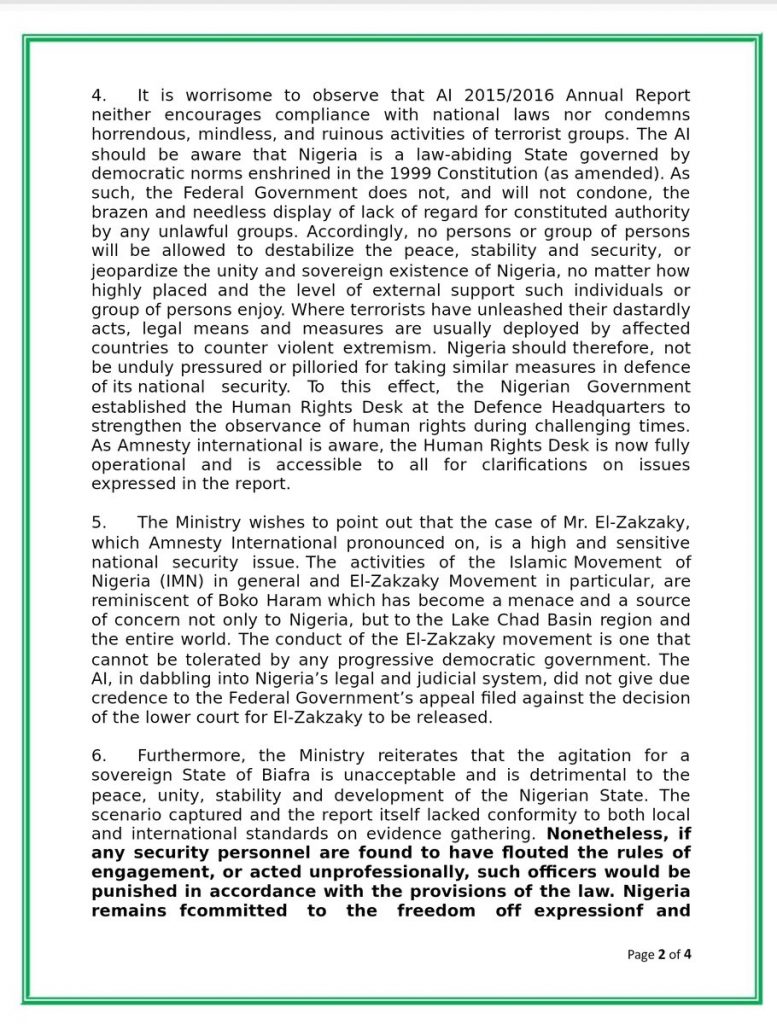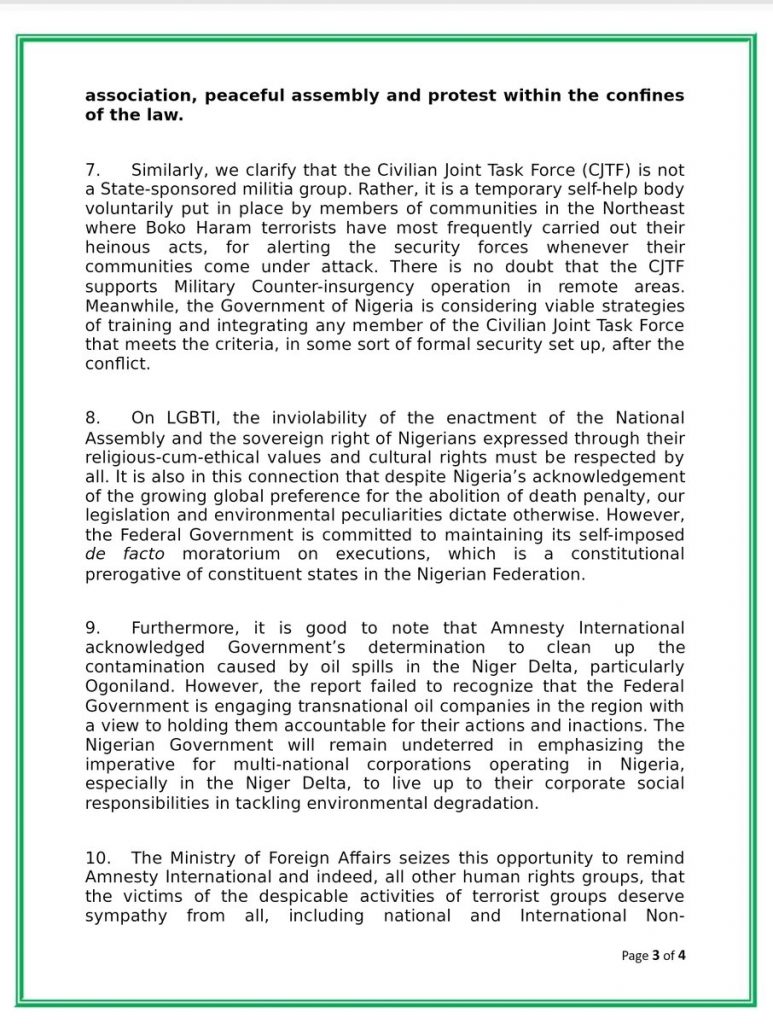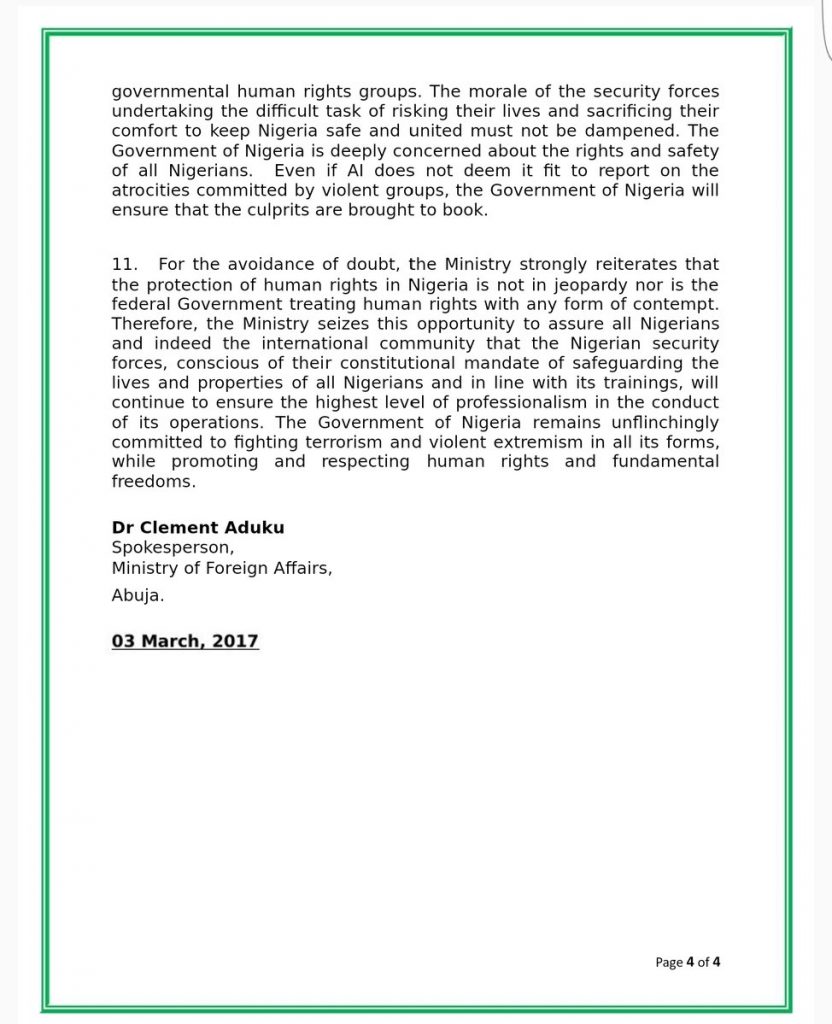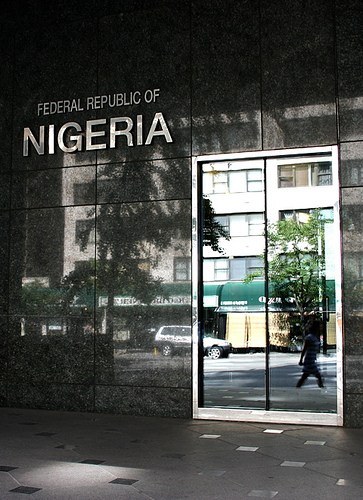The attention of the Ministry of Foreign Affairs has been drawn to the 2015/2016 Annual Report of the Amnesty International (AI). Nigeria recognises the work of international human rights organizations to investigate and report on thematic human rights issues in different countries. However, it is only factual, balanced and credible reporting by International Non-Governmental Organizations (INGOs) that would help in generating the desired result of encouraging Governments to continue to live up to their national and international obligations of promoting, protecting and safeguarding human rights and fundamental freedoms in their countries.
First and foremost, the Ministry notes that the 2016 AI Annual Report, at least, acknowledged Federal Government’s efforts to prevent human rights abuses in Nigeria. Nonetheless, a review of the publication clearly shows that AI is yet to fully appreciate and grasp the Nigerian context in protecting human rights while effectively and holistically countering terrorism and preventing violent extremism. In this regard, the Ministry wishes to make the following observations and comments:
It is utterly regrettable that the AI did not seem it fit and proper in line with best practice, to subject its Annual Report process to wide consultations and in-depth engagement. Hence, it casts unnecessary and unverifiable aspersions on critical institutions of the Nigerian State. Such omission made the scenario captured in the report itself to totally lack conformity to both local and international standards. It is in this regard that the Ministry encourages Amnesty International to endeavour to consult widely before releasing its future publications to ensure a more balanced, credible and unbiased reportage.
It is worrisome to observe that AI 2015/2016 Annual Report neither encourages compliance with national laws nor condemns horrendous, mindless, and ruinous activities of terrorists groups. The AI should be aware that Nigeria is a law-abiding State governed by democratic norms enshrined in the 1999 Constitution (as amended). As such, the Federal Government does not, and will not condone, the brazen and needless display of lack of regard for constituted authority by any unlawful groups. Accordingly, no persons or group of persons will be allowed to destabilize the peace, stability and security, or jeopardize the unity and sovereign existence of Nigeria, no matter how highly placed and the level of external support such individuals or group of persons enjoy. Where terrorists have unleashed their dastardly acts, legal means and measures are usually deployed by affected countries to counter violent extremism. Nigeria should therefore, not be unduly pressured or pilloried for taking similar measures in defence of its national security. To this effect, the Nigerian Government established the Human Rights Desk at the Defence Headquarters to strengthen the observance of human rights during challenging times. As Amnesty international is aware, the Human Rights Desk is now fully operational and is accessible to all for clarifications on issues expressed in the report.
The Ministry wishes to point out that the case of Mr. El-Zakzaky, which Amnesty International pronounced on, is a high and sensitive national security issue. The activities of the Islamic Movement of Nigeria (IMN) in general and El-Zakzaky Movement in particular, are reminiscent of Boko Haram which has become a menace and a source of concern not only to Nigeria, but to the Lake Chad Basin region and the entire world. The conduct of the El-Zakzaky movement is one that cannot be tolerated by any progressive democratic government. The AI, in dabbing into Nigeria’s legal and judicial system, did not give due credence to the Federal Government’s appeal filed against the decision of the lower court for El-Zakzaky to be released.
Furthermore, the Ministry reiterates that the agitation for a sovereign State of Biafra is unacceptable and is detrimental to the peace, unity, stability and development of the Nigerian State. The scenario captured and the report itself lacked conformity to both local and international standards on evidence gathering. Nonetheless, if any security personnel are found to have flouted the rules of engagement, or acted unprofessionally, such officers would be punished in accordance with the provisions of the law. Nigeria remains fcommitted to the freedom off expressionf and association, peaceful assembly and protest within the confines of the law.
Similarly, we clarify that the Civilian Joint Task Force (CJTF) is not a State-sponsored militia group. Rather, it is a temporary self-help body voluntarily put in place by members of communities in the Northeast where Boko Haram terrorists have most frequently carried out their heinous acts, for alerting the security forces whenever their communities come under attack. There is no doubt that the CJTF supports Military Counter-insurgency operation in remote areas. Meanwhile, the Government of Nigeria is considering viable strategies of training and integrating any member of the Civilian Joint Task Force that meets the criteria, in some sort of formal security set up, after the conflict.
On LGBTI, the inviolability of the enactment of the National Assembly and the sovereign right of Nigerians expressed through their religious-cum-ethical values and cultural rights must be respected by all. It is also in this connection that despite Nigeria’s acknowledgement of the growing global preference for the abolition of death penalty, our legislation and environmental peculiarities dictate otherwise. However, the Federal Government is committed to maintaining its self-imposed de facto moratorium on executions, which is a constitutional prerogative of constituent states in the Nigeria Federation.
Furthermore, it is good to note that Amnesty International acknowledged Government’s determination to clean up the contamination caused by oil spills in the Niger Delta, particularly Ogoniland. However, the report failed to recognise that the Federal Government is engaging transnational oil companies in the region with a view to holding them accountable for their actions and inactions. The Nigerian Government will remain undeterred in emphasizing the imperative for multi-national corporations operating in Nigeria, especially in the Niger Delta, to live up to their corporate social responsibilities in tackling environmental degradation.
The Ministry of Foreign Affairs seizes this opportunity to remind Amnesty International and indeed, all other human rights groups, that the victims of the despicable activities of terrorist groups deserve sympathy from all, including national and international Non-governmental human right groups. The morale of the security forces undertaking the difficult task of risking their lives ad sacrificing their comfort to keep Nigeria safe and united must not be dampened. The Government of Nigeria is deeply concerned about the rights and safety of all Nigerians. Even if AI does not deem it fit to report on the atrocities committed by violent groups, the Government of Nigeria will ensure that the culprits are brought to book.
For the avoidance of doubt, the Ministry strongly reiterates that the protection of human rights in Nigeria is not in jeopardy nor is the federal Government treating human rights with any form of contempt. Therefore, the Ministry seizes this opportunity to assure all Nigerians and indeed the international community that the Nigerian security forces, conscious of their constitutional mandate of safeguarding the lives and properties of all Nigerians and in line with its trainings, will continue to ensure the highest level of professionalism in the conduct of its operations. The Government of Nigeria remains unflinchingly committed to fighting terrorism and violent extremism in all its forms, while promoting and respecting human rights and fundamental freedoms.
